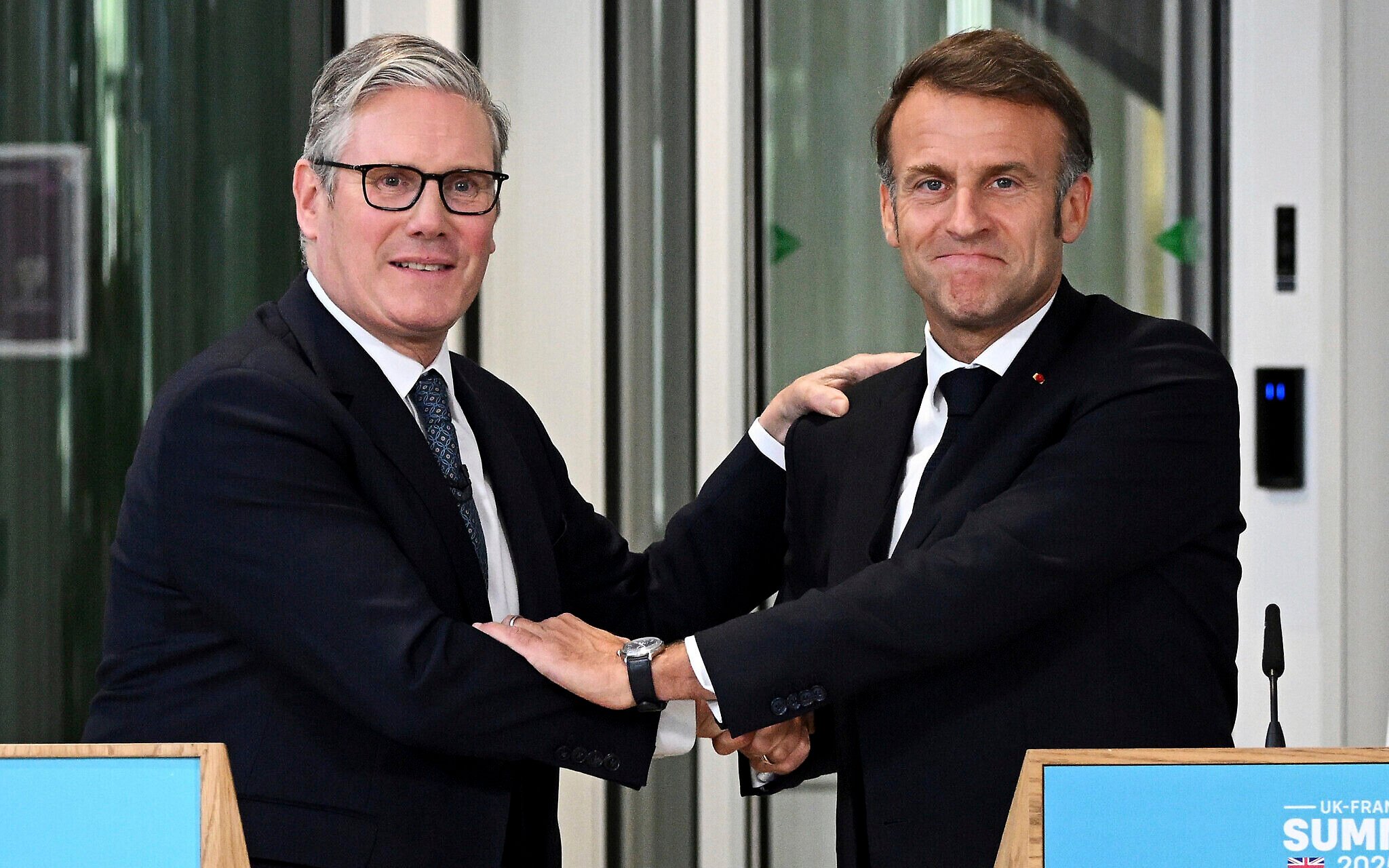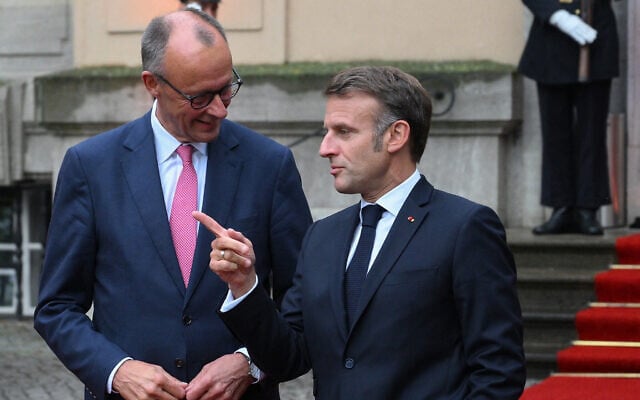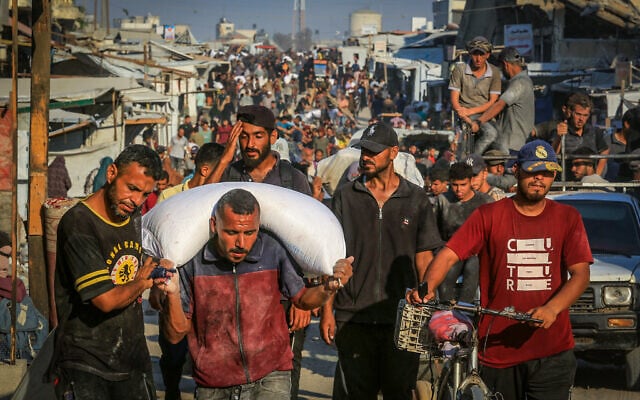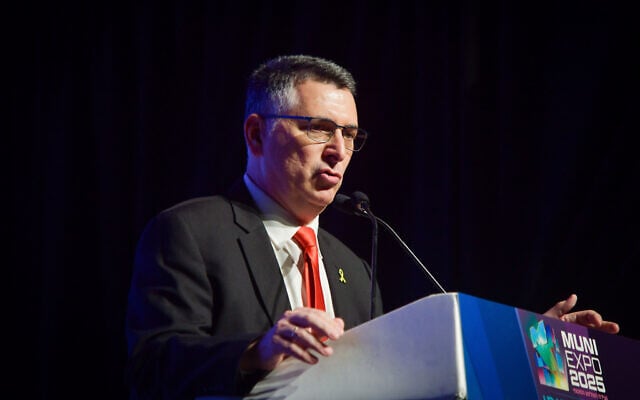



British Prime Minister Keir Starmer said Friday that recognizing Palestinian statehood should be part of a wider plan for lasting security for Palestinians and Israelis, in an apparent split from France, which announced its plan to take the step already in September.
Starmer said in a video statement that he is working with allies of the UK to advance a “pathway to peace” in the region and that recognizing a Palestinian state is part of that process.
“But it must be part of a wider plan which ultimately results in a two-state solution and lasting security for Palestinians and Israelis. This is the way to ensure it is a tool of maximum utility to improve the lives of those who are suffering – which of course, will always be our ultimate goal,” the British premier added.
Starmer didn’t elaborate further on the “wider plan” on which recognition of Palestine is conditioned, but he stopped short of declaring that he would take the step at the UN General Assembly in September as French President Emmanuel Macron announced he would do on Thursday.
While Starmer has indicated interest in the step, he faces some of the same pushback from conservatives domestically and from the US that Macron dealt with before ultimately moving ahead. Israel has also reportedly threatened countries that it will annex the West Bank if they go forward with recognizing a Palestinian state.
Starmer’s statement came after an emergency call on Friday held by the leaders of Britain, France, and Germany about the growing hunger crisis in Gaza.
All three support a Palestinian state in principle, but Germany said it has no immediate plans to follow France’s step, which Macron plans to formalize at the United Nations General Assembly in September.
Starmer, who is under mounting pressure to formally recognize Palestinian statehood, both from opposition lawmakers and from members of his own Labour Party government. Health Secretary Wes Streeting on Tuesday called for an announcement “while there’s still a state of Palestine left to recognize.”
More than 140 countries recognize a Palestinian state, including a dozen in Europe. But France, home to Europe’s largest Jewish and Muslim communities, will become the first major Western country, and first Group of Seven country, to recognize a Palestinian state, potentially giving greater momentum to a movement so far dominated by smaller nations that are generally more critical of Israel.
Israel and the US both denounced the decision as a reward for Hamas terrorism.
Britain has long supported the idea of an independent Palestinian state existing alongside Israel, but has said recognition should come as part of a negotiated two-state solution to the conflict.

Any such solution appears far off. There had been no substantive Israel-Palestinian negotiations for years, even before the terror group Hamas launched the October 7, 2023, attacks on Israel, which killed 1,200 people and sparked the current war.
The worsening humanitarian crisis in Gaza, where hunger is spreading and children have starved to death, according to the Hamas-controlled Gaza health ministry, has caused alarm even among Israel’s closest allies.
Germany has traditionally been a particularly staunch ally of Israel in Europe, with relations rooted in the history of the Holocaust. It says recognizing a Palestinian state should be “one of the concluding steps” in negotiating a two-state solution, and it “does not plan to recognize a Palestinian state in the short term.”
But Berlin, too, has sharpened its tone recently, describing Israel’s actions in Gaza as unacceptable and pushing for greater humanitarian aid, but still appears to favor trying to influence Israeli officials by direct contact.

The German government said in a statement Friday that it is in a “constant exchange” with the government and other partners on issues including a ceasefire in Gaza and the need to drastically improve humanitarian aid. It said it is “prepared to increase the pressure” if there is no progress, but didn’t elaborate on how.
Britain has halted some arms sales to Israel, suspended free trade talks, and sanctioned far-right government ministers and extremist settlers, but Starmer is under intense pressure to do more.
Labour lawmaker Emily Thornberry, who chairs Parliament’s Foreign Affairs Committee, said a majority of committee members supported immediate recognition of the state of Palestine.
“We’ve been in favor for 40 years of a two-state solution, and yet it’s been drifting,” she told Times Radio, saying Macron’s announcement should be a “kickstart” for the peace process.
In a phone call with his Canadian counterpart Anita Anand, Foreign Minister Gideon Sa’ar accused Hamas of thwarting Gaza truce-hostage talks and appeared to threaten retaliatory steps to France’s announcement yesterday that it would recognize Palestinian statehood, according to a readout from Israel’s foreign ministry.
“The diplomatic assaults on Israel in this sensitive period for negotiations encourage Hamas to harden its stances,” Sa’ar told Anand, according to the readout.
Sa’ar wrote on X that he told Anad that Israel said yes to the framework proposed by US special envoy Steve Witkoff while “Hamas stubbornly hardened its position.”
Regarding the humanitarian crisis in Gaza, where the United Nations and aid groups have warned of soaring hunger, Sa’ar in the conversation with Anand accused the UN of “not fulfilling its commitments to bring aid into Gaza” and preferring instead to engage in the “de-legitimatization of Israel,” the Israeli readout said.
“I also said that unilateral steps by France and other countries will only push Israel to take steps of its own,” Sa’ar wrote on X, without elaborating. “The French initiative harms the chances of achieving a hostage deal and ceasefire.”

Some opponents of countries unilaterally recognizing a Palestinian state maintain that the move is merely symbolic when done without Israel’s cooperation, adding that a Palestinian state can only be the result of negotiations between both sides of the conflict.
But supporters of the move say the current Israeli government is uninterested in such talks or a two-state solution and that the framework can therefore only be advanced through diplomatic pressure.
US President Donald Trump also commented on French President Emmanuel Macron’s announcement.
“Here’s the good news, what [Macron] says doesn’t matter,” the president told reporters on Friday. “[Macron]’s a very good guy, I like him. But, that statement doesn’t carry any weight.”
Meanwhile, a coalition of leading American Jewish organizations, including the Anti-Defamation League, American Jewish Committee, American Israel Public Affairs Committee, the Conference of Presidents of Major American Jewish Organizations, UJA-Federation of New York and the World Jewish Congress said Friday that they had declined an invitation to meet with French Foreign Minister Jean-Noel Barrot in response to Macron’s announcement.
“We are deeply concerned that France’s approach undermines prospects for a mutually negotiated future for Israelis and Palestinians,” the organizations said in a joint statement. “By taking such a unilateral step, France not only emboldens extremists but risks the security of the Jewish people around the globe, along with alienating moderate voices and undermining the credibility of French diplomacy in the region.”
They argued that President Macron has backpedaled on the conditions he laid out three months ago for recognition of a Palestinian state, including the release of the remaining hostages still held in Gaza and Hamas’s surrender.
